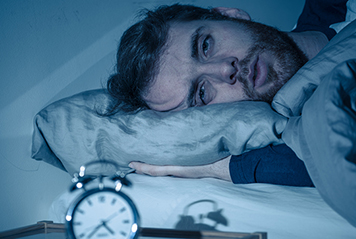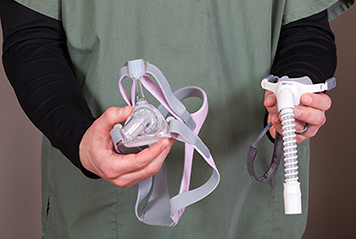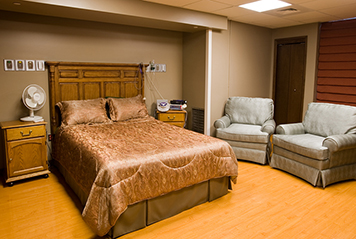8 Top Tips for Better Sleep
Not Sleeping Well? You’re not alone, especially these days. Almost half of all Americans suffer from some type of sleep disorder that keeps us from getting our proper rest.

Sleep is a key part of good health. Getting enough sleep helps the body recover from illness and injury. By contrast, not getting enough sleep over a period of time is linked to a variety of health problems, including obesity, diabetes, and heart disease.
So how much sleep do we really need? Well, that depends.
“Adults generally function best when they get seven to eight hours of sleep each night,” said Kristin Watson, PA-C, of Munson Healthcare Manistee Sleep Disorders Center. “Teenagers, however, tend to function best with eight to nine hours. To function optimally in both a physical and a mental sense, it’s essential to get enough sleep at the right time of day (or night) and in the right environment.”
Sleep Well to Be Well
Here are eight sleep-healthy tips for adjusting your routine and settling yourself to get the rest you need:
- Set a bedtime early enough for you to get at least seven hours of sleep.
- Maintain a regular sleep schedule; time to bed/time to rise.
- Exercise regularly, but not within two hours of bedtime.
- Maintain a temperature-, light-, and sound-controlled bedroom.
- Do not go to bed hungry. Eat a light snack, but not a heavy meal.
- Avoid caffeine, tobacco, and alcohol.
- The bedroom is for sleep, so leave your problems at the door by trying to unwind before bedtime.
- If you can’t sleep, don’t lie in bed awake. Get up and do something boring and return to bed when sleepy.
And good news: if you have a rough week, you can catch up on some sleep on weekends or days off. But too many sleepless nights in a row might be caused by a sleep disorder.
Common Sleep Disorders
Obstructive sleep apnea, restless leg syndrome, and insomnia are the most common sleep disorders seen in northern Michigan, especially during the fall season.

As the days get shorter, seasonal affective disorder (SAD) can contribute to insomnia. “SAD is a form of depression brought on by decreased exposure to sunlight,” Watson said. “Light therapy, combined with medications and counseling, can be very effective in improving symptoms and sleep. A trained sleep specialist is able to prescribe when and how long light exposure should be used.”
The return to school and a sudden change in routine can also affect children’s sleep habits. “Some teenagers have a hard time waking up in the morning and getting to school on time,” Watson said. “Most teenagers have a delayed sleep-wake cycle. Their body tells them to fall asleep between midnight and 2 am and to wake between 9 and 10 am. For some teenagers, this causes significant problems with learning and school attendance.” This is where a sleep specialist can be helpful in recommending treatment that lessens the impact on the individual student.
When to See a Sleep Specialist

The big question is whether your lack of sleep is from that afternoon cup of coffee or from an actual medical condition. The answer is actually pretty simple. If you’re following the tips above and still having trouble staying asleep? Then it might be time to see a specialist.
“If someone follows standard sleep hygiene recommendations and continues to have issues that’s when it’s appropriate to talk to your health care provider,” Watson said. “Your doctor can find out whether it’s a physical or medical problem and/or a stress or psychological problem. They frequently coexist and it’s difficult at times for a patient to distinguish between them. That’s when the health care provider in conjunction with a Munson Healthcare Sleep Specialist can help.”
A comprehensive program at Munson Healthcare Manistee Sleep Disorders Centers includes a consultation, sleep study, treatment, and follow-up care for a full range of conditions:
- Circadian rhythm disorders – disrupted sleep cycles because of jet lag, shift work, etc.
- Excessive daytime sleepiness
- Insomnia – difficulty falling or staying asleep
- Narcolepsy – daytime sleepiness with sudden, uncontrollable REM sleep
- Obstructive sleep apnea – temporary lack of breathing
- Restless leg syndrome
- Snoring, and more
For example, in patients who have sleep apnea, which is a condition that causes pauses in breathing during sleep, a sleep study allows the specialist to determine how many apneas the patient is having and to quantify their effect on the patient's cardiac, pulmonary, and neurological systems.
Not all patients with sleeping problems require sleep studies. But for some a sleep study allows the specialist to make an accurate diagnosis and understand its severity. Types of studies include:
Night and Day Sleep Studies
- Scheduled at your convenience to accommodate shift workers.
FAA and DOT Assessments
- Daytime alertness assessments to comply with Federal Aviation Association and Department of Transportation regulations.
Home Sleep Studies: A Screening Tool
- Home studies may be appropriate for people with uncomplicated, moderate to severe obstructed breathing (sleep apnea). Home studies measure only a few parameters. Your doctor may recommend a more comprehensive in-center testing, depending on your symptoms.
Munson Healthcare Sleep Disorder Centers
It’s important to understand that having consistent sleepless nights should not be normal. The vast majority of sleep problems can be accurately diagnosed and effectively treated, to significantly improve the quality of your

life. If you’re not sleeping well, talk with your primary care provider and ask to be referred to a Munson Healthcare sleep specialist.
This “Snore Score” quiz could help you determine whether an appointment is worthwhile.
Our skilled sleep specialists, including pediatric sleep specialists, are diplomats of the American Board of
Sleep Medicine. Our registered sleep technologists and respiratory therapists use state-of-the-art sleep technology to provide an accurate diagnosis – your gateway to good sleep.
Learn more about Northern Michigan sleep medicine services at munsonhealthcare.org/sleep, or contact us in Cadillac, Charlevoix, Grayling, Kalkaska, Manistee, and Traverse City.